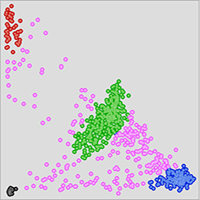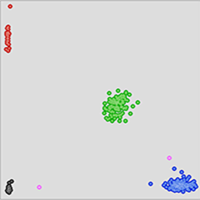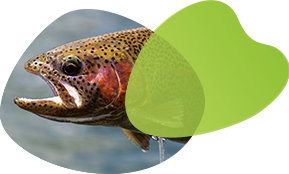Originally published : Mon, January 6, 2020 @ 6:48 PM
Updated : Mon, January 13, 2020 @ 5:08 PM
Best practice in sample collection for SeqSNP targeted genotyping by sequencing projects
When good goes in, great comes out
 Great genotyping data begins with good sample collection. Sampling can be tedious work, so we’re providing tips on proper collection to lock down efficiency and ensure the best outcome.
Great genotyping data begins with good sample collection. Sampling can be tedious work, so we’re providing tips on proper collection to lock down efficiency and ensure the best outcome.
When your sample number is getting into the thousands, make sure you’ve planned ahead to accommodate for:
- Training staff on how to sample consistently in both the stage of growth and number of samples needed, e.g. leaf punches.
- The amount of time it will take to sample.
- When and where the samples will be extracted.
Giving yourself ample time to properly collect your samples will reduce your stress, maximise on efficiency, and safeguard yourself from wasting any time or effort if done correctly. That way, you’re setting yourself up for success to produce quality data down the road.
For SeqSNP projects, the minimum number of samples that can be submitted is 48; however, we recommend a minimum of 96 samples due to the scales of the kits. Samples must be submitted in 96-well plates, see plating instructions below. Any samples submitted in tubes may incur a surcharge for sample transfer (excludes blood or buffy coat samples).
Accepted formats include:
1. Extracted DNA may be shipped on ice or at room temperature. The key here is that you need enough of it with sufficient quality and purity to produce the best data.
| Sample requirements |
Plating instructions |
|
|
Ensure the sampled material is of the same age across your sampling population. This is because the rate of cell division varies greatly in differently aged plants, which therefore affects the amount of DNA that can be extracted. Older leaf tissue may require more leaf punches (e.g. 7-9) vs. young leaf tissue which may require less (e.g. 4-6) in order to provide sufficient DNA.
2. Plant samples
Here are some guidelines for plant sampling:
- Sample from consistent positions of each plant.
- Avoid midrib and axillary veins on leaves.
- Sample leaf material at L3/L4 stage (i.e. 2-3 leaves on the main shoot, and third/fourth leaf has appeared).
 Considerations: As DNA extraction efficiency is highly crop and sample-type dependent, it is possible that our extraction protocol may require optimisation to ensure sufficient DNA is obtained. This may involve a short pilot study of your species. Contact us to learn more.
Considerations: As DNA extraction efficiency is highly crop and sample-type dependent, it is possible that our extraction protocol may require optimisation to ensure sufficient DNA is obtained. This may involve a short pilot study of your species. Contact us to learn more.- If submitting seeds, ensure they are stored dry and ungerminated and that they fit easily into the BioArk Seed Collection Kit for submission.
Check to see if your plant species is listed on our current plant species list.
| If yes: | If no: |
|
|
Our BioArk Collection Kits improve the quality of the DNA that is extracted from the plant material which in turn yields dramatically improved genotyping data (Figure 1).
Figure 1
DNA quality without using the BioArk Leaf* KASP™ genotyping data with BioArk Leaf**


*Genotyping data from plant leaf samples collected without using BioArk Leaf and extracted using non-LGC, Biosearch Technologies extraction chemistry. The call rate is 71.1%.
**Genotyping data from plant leaf samples collected with the BioArk Leaf and extracted in our service laboratory using sbeadex™ extraction chemistry. The call rate is 99.5%.
3. Non-plant tissue samples, e.g. whole blood, buffy coat or solid tissue

- We pride ourselves in collaborating with our
customers to create custom solutions to meet their specifications. Please enquire prior to commencing your project. - For aquaculture, we have the BioArk Fish Collection Kit to collect regularly-sized fin clips directly into an extraction-capable 96-well format without the use of ethanol, freezing or buffers. This greatly improves storage and shipping logistics and helps protect samples from degradation associated with defrosted packages.
We recommend performing DNA extraction using sbeadex™ chemistry, which delivers nucleic acids of high yield, purity and quality. We conveniently have kits specific for plant and livestock. Check out this application note on seed extraction using sbeadex plant kit.
Or you can outsource this step to our DNA extraction services team. If you have any questions on sample collection and preparation, our team of experts are happy to help!


